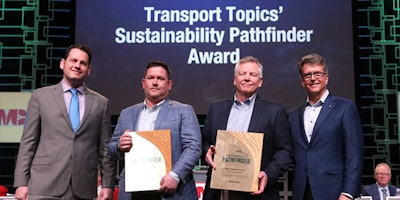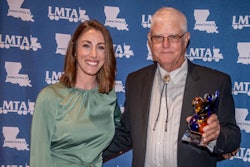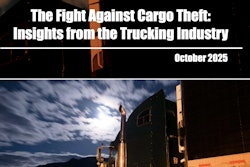
Estes Express Lines, the largest, privately owned freight carrier in North America based in Richmond, Virginia, was honored with Transport Topics’ inaugural Sustainability Pathfinder Award. The award was created to recognize two companies within the freight transportation industry that are paving the way for a greener future. Estes was the only for-hire carrier to receive the award, which was announced at the 2024 Technology & Maintenance Council Annual Meeting in New Orleans.
“Sustainability is at the crux of every venture we pursue as a company – ensuring whatever we do can be successfully maintained without adverse harm to our operations, our people and the environment,” said Webb Estes, president and COO. “It’s a tremendous honor to receive the first-ever Sustainability Pathfinder Award. This is a topic of importance for all transportation companies, and we’re committed to collaborating with our peers and sharing our learnings so that we can have the biggest impact as an industry.”
Earlier this year, Estes began working with Watershed, an enterprise sustainability platform provider that empowers companies around the world to take action on climate change. The initial phase of Estes’ work with Watershed will be to complete its first-ever carbon footprint. Estes will use its 2023 footprint as a baseline to begin analyzing its emissions data and identify emissions hot spots. This foundation will inform new reduction targets to guide Estes’ sustainability efforts.
“This is an exciting time as we take steps to formally assess and track our collective sustainability efforts and identify those areas where Estes can have the biggest impact,” said Sara Graf, vice president of sustainability, culture and communications. “The success of our sustainability program stems not only from utilizing innovative ideas and technologies, but also the enthusiasm we’ve seen from our employees to test and deploy those tools that help us reduce our carbon footprint.”
Some of Estes’ recent sustainability initiatives include expanding its electric-vehicle fleet of 12 electric trailers and nearly 300 zero-emission forklifts and retrofitting select terminals with solar panels – which are expected to generate approximately 1,667,000 kilowatt hours annually, offsetting about 1,180 metric tons of carbon dioxide.








